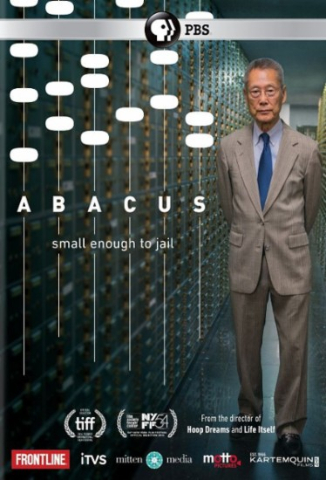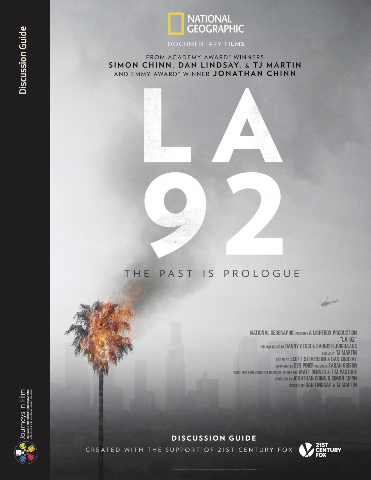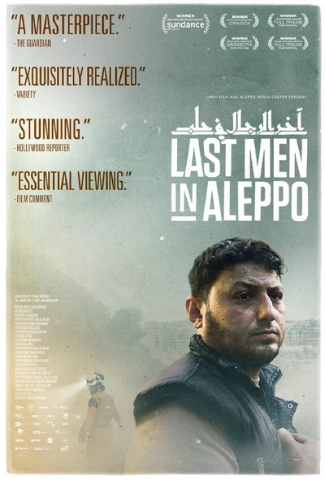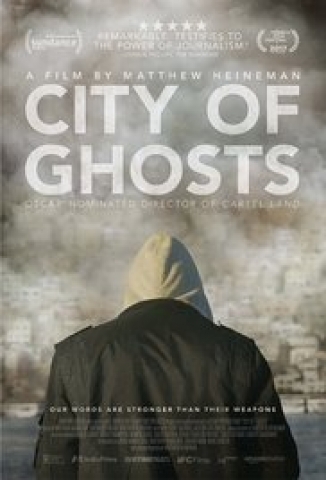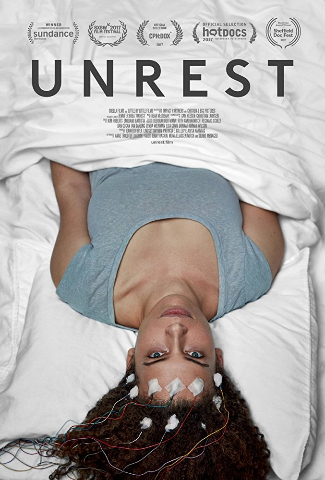Oscar Bound Documentaries
Final Five to be Announded January 23
By: Nancy Kempf - Jan 11, 2018
If there were one word to characterize this year’s selection of possible documentary Oscar nominees, it would have to be nihilism. From attacks on civilians in Raqqa and Aleppo to the greatest displacement of human populations across the globe in history to the abuse of justice in the Great Recession to the mendacity that plagues the once noble world of athletics to the biases of the health care system to that other monumentally entrenched injustice that is race in America to the ultimate and absolute nihilism that is global warming – documentaries sounded the clarion call. But if a documentary rattles the alarm and no one hears it, does it make a sound?
As much as Hollywood has embraced films based-on-a-true-story, much documentary film making has been relegated to cable and streaming services. In its preliminary round of voting, the Academy of Motion Picture Arts and Sciences selected 15 films of the 170 submissions for Best Documentary Academy Award, many produced by Amazon Studios, Netflix, HBO, et al. I do not know to what extent these 15 documentaries (much less the other 155) were accessible, even to coastal audiences, but the only one to have appeared in my theaters in 2017 was Al Gore’s climate change follow-up, “An Inconvenient Sequel: Truth to Power.”
On January 23, the Academy will announce the five that will contend for the Best Documentary Oscar. If you are interested in watching the 15 shortlisted films, here is a guide to where you can stream (most of) them.
Endurance: “City of Ghosts,” “Last Men in Aleppo,” “Human Flow” and “One of Us”
Two Syrian war-related films made the Academy’s shortlist. “City of Ghosts,” a production of A & E/Amazon Studios, is directed by Matthew Heinmann, whose 2015 “Cartel Land” earned an Oscar nomination in 2016. “City of Ghosts” follows media activist group RBSS, Raqqa Is Being Slaughtered Silently. One of the few reliable sources of news information from the region, RBSS started in 2014 with 17 citizen journalists. They are ISIL targets, yet persist in getting their stories to fellow Syrian RBSS activists housed in undisclosed locations in Germany so that they might inform the world. (Available for streaming on Amazon Prime Video.)
The 2016 British short documentary “The White Helmets,” directed by Orlando von Einsiedel, was awarded the Best Documentary (Short Subject) at the 2017 Academy Awards. The film follows the Syrian Civil Defense, a group of volunteer rescue workers who triangulate the targets of air strikes in order to get to victims trapped in the rubble as quickly as possible. The White Helmets are again the subject, here in Feras Fayyad’s “Last Men in Aleppo,” which premiered on PBS’s series POV. This time the focus is narrowed, primarily to a man we know only as Khaled, and it is heartbreaking to see his despair even in his role as a loving, gentle father. Writing in the New York Times, Glenn Kenny says, “this is an essential film, but it is also a terribly dispiriting one. … ‘Last Men in Aleppo’ is likely to make you almost ashamed of your comforts and leave you with a feeling of impotence.” All the more reason to make every effort to see it. (Available for streaming on Netflix.)
The Amazon Original Movie “Human Flow” is Chinese dissident and artist Ai Weiwei’s sweeping examination of the human consequences of globalization. We are living through an unprecedented global refugee and migrant crisis. Ai takes us to the wandering lives of people in Israel and Jordan, Kenya, Malaysia, Pakistan, Turkey, as well as destinations in Europe and North America. In her review for the New York Times, Manohla Dargis writes that Ai “wants to give you a sense of the scale of the crisis, its terrifying, world-swallowing immensity.” (Available soon for streaming on Amazon Prime Video.)
Heidi Ewing and Rachel Grady’s “One of Us” is a Netflix Original documentary that follows three Hasidic Jews whose decision to leave their ultra-Orthodox Brooklyn community means stepping out from under a world of comprehensive control and into an alien world of isolation. Etty, who is trying to protect herself and her children from an abusive husband, finds that her husband’s attorneys can manipulate the law to his advantage and separate her from her children. She finds some solace in the support group Footsteps, which offers help and encouragement to individuals seeking to escape the suffocation of codified Orthodox constraints. A teenager, who has begun to realize he has been taught next to nothing in his Orthodox schools, cuts his hair and tentatively ventures into the world beyond his neighborhood. When he discovers Wikipedia, he describes it as “a gift from God.” Luzer, a struggling actor, has made it all the way to LA, but among the consequences of his departure have been a complete rupture with his family and estrangement from his children. We leave the three with the sense each will find a way to come to terms with independence. (Available for streaming on Netflix.)
Injustice: “Abacus: Small Enough to Jail,” “Icarus” and “Unrest”
Steve James’s “Abacus: Small Enough to Jail” which originally aired as part of PBS’s Frontline series, chronicles the gross injustice Manhattan District Attorney Cyrus R. Vance, Jr. brought against the Sung family in the wake of the 2008 financial crisis. For decades, Abacus, the Song’s federal savings bank in New York’s Chinatown, has served an immigrant community other financial institutions routinely turn away. James’s award-winning documentary work spans 30 years and includes titles familiar to documentary viewers. 1994’s “Hoop Dreams” looks at two Chicago high schoolers who dream of becoming pro players; 2002’s “Stevie” explores James’s own reunion with a boy he mentored through the Advocate Big Brother program; 2004’s seven-hour PBS series “The New Americans,” surveys the lives of several immigrants over the course of four years; 2006’s “The War Tapes” investigates the invasion of Iraq, filmed by the soldiers themselves; 2011’s “The Interrupters” follows individuals who try to stave off violence in Chicago communities; 2012’s “Head Games” delves into the devastating consequences of sports concussions; and 2014’s “Life Itself” presents a biographical homage to the late film critic Roger Ebert. “Abacus” brings the same sense of humanity and community that James shines on stories too often buried beneath the headlines. (Available for streaming on Amazon Prime.)
If you doubt Russia interfered in the 2016 election, you will learn that such meddling may have been small potatoes compared to its intricately designed athletic doping cover-up in the 2014 Sochi Olympics. Bryan Fogel is a playwright who also happens to be an avid amateur cyclist. His first run at the Haute Route, the Tour de France of the amateur cycling world, coincided with the breaking story of the Lance Armstrong doping scandal. With “Icarus,” Fogel chronicles his decision to investigate doping using himself as his subject. What starts as a fairly routine Morgan Spurlock-esque immersion story takes a cloak and dagger turn when Fogel is put in contact with Dr. Grigory Rodchenkov, a Russian chemist who ran his country’s accredited anti-doping operation. Rodchenkov, a charmingly charismatic fellow, and Fogel forge an abiding friendship, and in the process, Rodchenkov risks everything to blow the lid off Russia’s comprehensive, state-sanctioned conspiracy. The epitaph that opens “Icarus” is attributed to George Orwell: “During times of universal deceit, telling the truth becomes a revolutionary act.” Once Rodchenkov arrives in the United States, with a well-worn copy of “Nineteen Eighty-Four,” the film’s structure takes on an eerie Orwellian progression. (Available for streaming on Netflix.)
In 2011, after a high fever, Jennifer Brea fell victim to myalgic encephalomyelitis, more commonly referred to as chronic fatigue syndrome. The disease is characterized by, among other symptoms, joint and muscle pain, digestive issues, extreme light and noise sensitivity and cognitive problems. “Unrest” is Brea’s video diary of her ensuing battle with the disease and of the struggles of other sufferers she has met online. Yet a subtext emerges, as the narrative unfolds, about the biases that inform medical practice. In part its unfortunate nomenclature (chronic fatigue) has made it too easy for the general public and the medical community alike to write patients off as delusional, lazy or both. Though the disease afflicts almost twice as many people as multiple sclerosis, dollars devoted to research are a tiny fraction of those spent on MS and on other chronic afflictions. Anyone touched by this maddeningly elusive disease should be gladdened by Brea’s courage in telling her unvarnished story. (Available for streaming through purchase only on Amazon Prime Video.)
Race: “LA 92” and “Strong Island”
If you are of a certain age, middle-aged at least, you can probably remember the events of the spring of 1992. An all-white jury found two of the four officers indicted for use of excessive force in the beating of Rodney King guilty. They both were sentenced to 30 months in prison. The other two officers were exonerated. The day the verdicts were handed down, April 29, rioting began in the streets of Los Angeles. Daniel Lindsay and T.J. Martin’s “LA 92,” which premiered on the National Geographic Channel, bookends its narrative with the 1965 Watts riots, and tells the story of the events of 1992 through archival footage, as raw today as it was 25 years ago. (Available for streaming on Amazon Prime Video.)
Another story from 1992, and one with which you are likely unfamiliar, is more personal. That same spring, on April 7, 24-year-old William Ford Jr., an unarmed black man, was killed by 19-year-old Mark Reilly, a white auto mechanic. Allegedly, in the course of a dispute over Ford’s car’s repair, Reilly insulted Ford’s mother. When confronted, Reilly pulled out a shot gun. The grand jury handed over a “No True Bill,” a legal procedure to dismiss charges against a defendant when the panelists believe there is insufficient evidence to bring charges. Yance Ford, now a transgender man, was William’s younger sister, and “Strong Island,” ten years in the making, is his meditation on what happened that night and the repercussions the event has had on the family dynamic in the ensuing years. “Strong Island” relates an intensely personal story that examines what is known of objective facts while mining the emotional currents that shape those facts, and bravely confronts complex questions of guilt and innocence. (Available for streaming on Netflix.)
Climate: “An Inconvenient Sequel: Truth to Power” and “Chasing Coral”
If Al Gore sounds frustrated in “An Inconvenient Sequel: Truth to Power,” can you blame him? The documentary, directed by Bonni Cohen and Jon Shenk, is, as its title spells out, a sequel to 2016’s “An Inconvenient Truth,” which was a rather wonkish approach to laying out the threat of global warming. That is a statement, not a criticism, because if in-your-face activism, time-lapse photography, or Werner Herzog’s suicidal penguin (“Encounters at the End of the World,” 2007) can’t make you get it, maybe a wonky method will. There are moments in “Sequel” when Gore loses his wonkish cool. Again, can you blame him? (Available for streaming on Amazon Prime Video.)
In 2012, documentarian Jeff Orlowski released “Chasing Ice.” The film follows James Balog’s Extreme Ice Survey project, which, in 2007, began monitoring 24 of the world’s largest glaciers as they melted before the team’s very eyes. In “Chasing Coral,” a Netflix Original documentary, Orlowski teams up with Richard Vevers, CEO of The Ocean Agency, which the former advertising professional founded after something of a midlife crisis. He reasoned that the fact that most of us do not see below the ocean’s surface is one of its liabilities, and that mediating on its behalf would be a superior life purpose to advocating for 3-ply toilet paper. Every player in this riveting film is passionate, from Ruth Gates, Director of the Hawaii Institute of Marine Biology; to Dr. C. Mark Eakin of the National Oceanic and Atmospheric Administration who directs Coral Reef Watch; to Ove Hoegh-Guldberg, Director of the Global Change Institute and Professor of Marine Science at the University of Queensland in Brisbane, Australia; among many others. But the most magnetic is Zackery Rago, a long-time aquarist and scuba diver with View Into the Blue, a tech company that manufactures underwater camera systems and monitoring instruments. Zack’s love for coral is palpable on the screen, and when he mourns its loss, you would have to be made of stone not to mourn it, too. (Available for streaming on Netflix.)
On a Happier Note: “Long Strange Trip,” “Ex Libris: The New York Public Library,” “Faces Places” and “Jane”
The six-part documentary about the Grateful Dead, “Long Strange Trip,” is, indeed, long. It feels as though director Amir Bar-Lev has ferreted out every reel, every snippet, every snap ever taken of the band, which, if you are a diehard dead-head might interest you. For this viewer, however, a big fan of rock documentaries and concert films, it was a long slog. Use your streaming services to take a more fruitful trip down memory lane with some of the masterworks of the genre – D. A. Pennebaker (“Don’t Look Back,” “Monterey Pop” and “Ziggy Stardust and the Spiders from Mars”); Jim Jarmusch (“Year of the Horse”); Michael Wadleigh (“Woodstock”); or Martin Scorsese (“The Last Waltz”); among many other great rock documentaries. (Available for streaming on Amazon Prime Video.)
These last three I was unable to screen:
“Ex Libris: The New York Public Library” sounds like a documentary dream come true. For starters, it is directed by the great Frederick Wiseman, who has worked in the form since the 1960s, covering scores of subjects. Writing about Wiseman’s 2014 “National Gallery” for rogerebert.com, Glenn Kenny remarks, “It simply won’t do to call [him] a documentarian. Even film critics and film lovers who normally aren’t all that actively/avidly enthusiastic about the documentary feature as a form…have to give it up for Wiseman.” What Wiseman documents in “Ex Libris” is an institution invented for books at a time when the book may be destined, if not to obsolescence, at least to obscurity. (Unavailable at this time.)
Agnes Varda, now 89 years old and one of the leading figures of the French New Wave, and 33-year-old French photographer and muralist JR co-directed “Faces Places.” Varda and JR hit the road in JR’s photo truck. Tooling through the French countryside, they encounter locals and listen to their stories. JR produces larger-than-life portraits that he displays on houses, barns, storefronts and trains, while Varda documents their adventure. (Unavailable at this time.)
When Jane Goodall, at age 26, first ventured into the forest to study chimpanzees, I was seven, and by the time National Geographic’s 1965 documentary “Jane Goodall and the Wild Chimpanzees,” narrated by Orson Welles, came out, I was twelve, so I feel I have grown up knowing Goodall most of my life. That film came from footage shot by wildlife photographer Hugo van Lawick, who would later become Goodall’s first husband. According to Ben Kenigsberg’s review for the New York Times, National Geographic Studios’ new film “Jane,” directed by Brett Morgen, “draws on more than 100 rediscovered hours from National Geographic’s archives. The abundant raw material allows Mr. Morgen to construct the impression of a complete narrative arc,” Kenigsberg continues, “and to show the tedious work of gaining the trust of the chimps and collecting data in fast forward, conveying the excitement of scientific discovery with adventure-movie momentum.” (Available for Amazon Prime Video purchase on January 23, 2018, and available now for streaming on Amazon Prime Video only with Fire TV or Fire TV Stick.)

